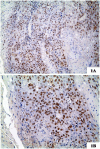Epigenetic disregulation in oral cancer
- PMID: 22408457
- PMCID: PMC3292026
- DOI: 10.3390/ijms13022331
Epigenetic disregulation in oral cancer
Abstract
Squamous cell carcinoma of the oral region (OSCC) is one of the most common and highly aggressive malignancies worldwide, despite the fact that significant results have been achieved during the last decades in its detection, prevention and treatment. Although many efforts have been made to define the molecular signatures that identify the clinical outcome of oral cancers, OSCC still lacks reliable prognostic molecular markers. Scientific evidence indicates that transition from normal epithelium to pre-malignancy, and finally to oral carcinoma, depends on the accumulation of genetic and epigenetic alterations in a multistep process. Unlike genetic alterations, epigenetic changes are heritable and potentially reversible. The most common examples of such changes are DNA methylation, histone modification, and small non-coding RNAs. Although several epigenetic changes have been currently linked to OSCC initiation and progression, they have been only partially characterized. Over the last decade, it has been demonstrated that especially aberrant DNA methylation plays a critical role in oral cancer. The major goal of the present paper is to review the recent literature about the epigenetic modifications contribution in early and later phases of OSCC malignant transformation; in particular we point out the current evidence of epigenetic marks as novel markers for early diagnosis and prognosis as well as potential therapeutic targets in oral cancer.
Keywords: epigenetics; molecular therapy; oral cancer; prognosis; tumor progression.
Figures

References
Publication types
MeSH terms
Substances
LinkOut - more resources
Full Text Sources
Medical

